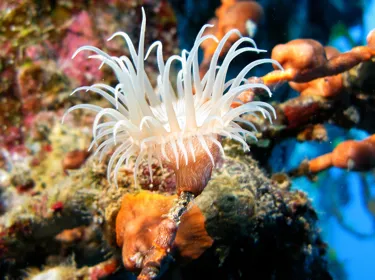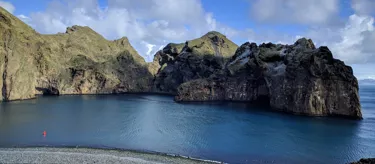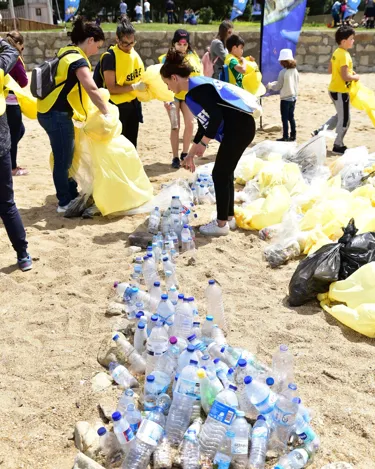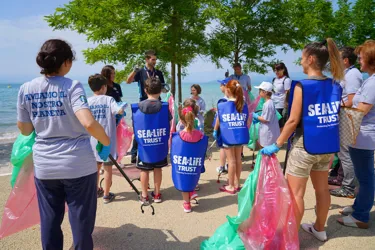What is Marine Conservation?
- Thursday 1st June 2023

Learn about the importance of marine conservation and discover how we support the conservation of our oceans at the SEA LIFE London Aquarium
What is marine conservation?
Marine conservation, sometimes referred to as ocean conservation, is the protection and preservation of the ecosystems that reside in the world’s oceans and seas (yes, they are technically different). Marine conservationists do this by helping to create and enforce endangered species laws, studying marine populations (to understand the negative impacts of human activities), establishing protected zones to help restore marine life, and educating people about the importance of marine conservation and the wonderful creatures kept safe by it.
Here are some of the problems that marine conservationists are trying to fix:
- Ocean acidification
- Rising sea levels and increasing ocean temperatures
- Marine fisheries and fishing practices, such as whaling and finning
- The effects of coral bleaching
- Pollution in the oceans (such as plastics, chemical runoff and oil spills)
- Studying and protecting rare or endangered species.
Healthy oceans and marine ecosystems support all life on this planet. Whether directly or indirectly, they provide critical life support functions for every human and animal we know of (and the ones that we don’t know as well).
Our oceans help us with pollution control and the slowing of climate change, storm protection and shoreline stabilisation, and our supply of food and medicines.

1. Some facts about marine conservation
If you’re interested in marine conversation and ocean preservation efforts, take a look at some of these interesting, inspiring and incredible facts about our seas and the work like-minded people have done over the years to keep them safe.
- Thanks to the SEA LIFE Trust (the SEA LIFE Centre’s charity, which we’re very proud of), we managed to open the world’s first Beluga Whale Sanctuary in Iceland, a natural sea sanctuary in a sea inlet. At the centre, the team of scientists and researchers study our rescued whales, named Little Grey and Little White, to advance our knowledge and support the protection of beluga whales in the wild.
- Our oceans contain more than 97% of the whole world’s water and they cover about 71% of the planet. As a result, the ocean generates an estimated 50 to 80% of the Earth’s oxygen, with the help of tiny phytoplankton that photosynthesise whilst living life on the ocean’s surface. We need to keep all
our oceans safe and clean in order to keep everyone happy, healthy and breathing fresh air.
- Since the introduction of the 5p shopping bag charge (which many marine conservationists in the UK actively campaigned for), there has been a 50% to 60% decrease in the number of plastic bags found on UK beaches. The plastic bags that enter our ocean from our beaches can get tangled up with marine wildlife or mistakenly eaten by marine species like turtles. There is also a risk to humans, as microplastics are entering our water supplies from the plastic materials in our seas. Unfortunately, around eight million metric tons of plastic are dumped by various sources into our oceans every year. That’s the same weight as nearly 57,000 blue whales!
- The study and practice of marine conservation is actually a relatively new advancement in the story of humankind. It wasn’t until the 1960s that the findings of ocean conservationists (such as the decline of major fish populations and the mass deterioration of underwater ecosystems) became widely understood and accepted. Luckily, marine conservation today is regarded as one of the world’s most important scientific issues.

2. Why is marine conservation important?
Our oceans are essential for biodiversity and the survival of almost all species of animals on the planet, including humans. This is why marine conservation (also known as ocean conservation) is such an important subject in all of our lives today. With the increases in pollution, the dangers of climate change and the rapid loss of ocean habitats, the need for conservation efforts is becoming larger and larger each day.
With about 7 billion kilogrammes of plastic entering our oceans every year (and with a lot of it being irretrievable because it often sinks to the bottom of the ocean), scientists predict that by 2050 all the plastic in our oceans will outweigh all of the fish - which is pretty terrifying when you think about it. This level of plastic will destroy many different ecosystems and have enormous negative impacts on food and medicine for future generations.
Equally, with rising sea levels and increased extreme weather events (as a result of global warming), the conservation of coral reefs has become extremely important. As they protect coastal towns by helping to form a barrier that breaks waves before the shoreline, they are vital for infrastructure and to prevent loss of life during storms, tsunamis, floods and erosion (this is especially pertinent for people’s homes in the future).
3. What can I do to help save the ocean?
Although some of those statistics might seem overwhelming, there are many ways that you can help to keep our oceans safe and clean and make a real difference for future generations. Here are five key things you can do right away:
- Learning and Volunteering. One of the best things you can do to save our oceans is to learn everything you can about them. With a solid knowledge of how marine ecosystems work and how to keep them safe, you can start to support local organisations and protected zones. If you want to help right now (and learn a lot along the way), you should start looking for volunteering opportunities involved in ocean protection in your local community.
- Beach Clean Events. If you happen to live near one of the UK’s beautiful sandy (and sometimes pebbly) beaches, there’s no better way to make a difference to the ocean community (and your own) than by organising a beach clean. In most coastal towns, there are usually charities already doing this regularly, so it’s worth getting in touch. At low tide, it is even possible in some places right here in London, only a stone’s throw from SEA LIFE London, on one of the Thames’ beaches, to get involved in a beach clean to collect rubbish before it can be swept down to the sea. Alternatively, you can grab a rubbish bag and some protective equipment and clean up your local beach with your family or friends. It’s a fun outing for people of all ages, though children should always be supervised by adults. The Marine Conservation Society has produced a Beach Clean Advice guide to help make sure you stay safe, and we recommend you read it.
- Stop Single-Use Plastics. One of the easiest ways to support marine conservation efforts nationally is also one of the simplest: stop using single-use plastics today. For those of you that are unsure what single-use plastics are, they are plastic items that are intended for a single use before being thrown away (this includes plastic straws, shopping bags, food containers, sweet wrappers, plastic bottles, picnic cutlery and much more). If we stop using them, then companies won’t see the need to manufacture them. Then, these plastics can’t end up in our oceans.
- Eat Sustainable Fish. If you’re a fan of eating fish (like many people are), try to eat sustainably and ethically farmed fish. Somewhere between 30% and 40% of all UK fish stocks are currently overfished, but there are many less eaten species that are better options. Check how the fish you buy is caught as well, for example, fishing that trawls the seabed can cause huge amounts of damage to ecosystems.
- Spread the Word. Learning about the array of natural life in our oceans can be a truly unforgettable adventure. In fact, scientists think that up to 50 million species have yet to be found and classified (that’s a lot of fish). So, as marine conservation relies on everyone understanding what our oceans give us and what we could lose if they’re not taken care of properly, the greatest thing you can do is tell people about what you’ve learnt here today. Let everyone you meet know what they can do to safeguard ocean ecosystems and the many species that have yet to be discovered in the deep blue sea.

4. How do SEA LIFE support marine conservation?
At the SEA LIFE Centres, we understand the problems our oceans and their inhabitants face. As a result, we’ve taken on a number of conservation projects to help protect our oceans over the years. Since 2014, we’ve been supporting our global charity SEA LIFE Trust with its many preservation programmes around the world. In this short time, we’ve already established new marine protection areas, reduced the amount of marine litter in our oceans, helped a whole bunch of sea turtles and rescued hundreds of sick and injured seal pups.
Some of our most notable work includes the world’s first beluga whale sanctuary in Iceland. Designed to highlight an alternative way of caring for and nurturing this beautiful species, we hope to encourage other conservation experts to do the same by setting an example with our sanctuary. This solution could potentially transform the lives of not only our beluga whales but over 3,000 other whales in need of rescue or rehabilitation as well. It could also change the lives of dolphins around the world who are currently living under human care or performing in shows daily. We think all our aquatic friends deserve better.
Equally, SEA LIFE Trust has opened a dedicated seal rescue sanctuary in Cornwall. Every year, our Cornish Seal Sanctuary helps and cares for sick and injured seal pups who would not survive otherwise. These small pups need help for a number of different reasons, including after getting injured in storms, becoming separated from their mothers, or getting tangled in ocean litter. On our site, we have a hospital with specialists and animal experts who care for the baby seals and help them to re-enter the sea when they’re strong enough. We also provide a long-term home and ongoing care for any animals that cannot be released back into the wild.
Finally, SEA LIFE Trust supports national marine life and ecosystems through the organisation of beach cleaning events all around the country. From plastic bags and disposable cutlery to old phone covers and drink bottles, if you can think of it, we’ve probably found it on the nation’s beaches! So, to combat this serious threat to marine life, we welcome everyone of all ages.
We’ve cleaned with individuals looking to make a difference, families (big and small), youth groups, student groups and local community activists, over the years. All you need to do is bring a coat (in case it gets cold), a pair of protective gloves and a packed lunch (and yourself, of course). Through beach cleaning events, you have the chance to directly protect and preserve our native aquatic creatures and their habitats. So, sign up today and make a real difference. Our oceans can’t protect themselves, which is why we need you to get involved.
5. FAQs about marine conservation
- What can I do to help save the ocean
There are many ways that you can help to keep our oceans safe and clean and make a real difference for future generations. The five simplest things are: learning about our oceans and volunteering with organisations, taking part in local beach cleaning events, stopping single-use plastics, eating sustainably and spreading the word about marine conservation.
- What does a marine conservationist do?
A marine conservationist can do a number of things to protect, restore and enhance the ocean’s biodiversity and marine habitats. This includes creating and enforcing endangered species laws, studying marine populations and establishing protected zones to help marine life to recover.
- What is marine conservation?
Marine conservation, sometimes referred to as ocean conservation, is the protection and preservation of the ecosystems that reside in the world’s oceans and seas. Marine conservationists try to understand how to restore the ocean’s biodiversity in the face of climate change, pollution and unstainable fishing.
- Why is marine conservation important?
Marine conservation (also known as ocean conservation) is important because our oceans are essential for biodiversity and the survival of almost all species of animals on the planet, including humans. They contain more than 97% of the whole world’s water supply, and between 50% to 80% of the oxygen we all breathe.
Join us in our mission
Our love for the ocean and its creatures extends far and wide.